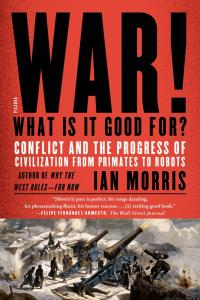 War! What Is It Good For?: Conflict And The Progress Of Civilization From Primates To Robots
War! What Is It Good For?: Conflict And The Progress Of Civilization From Primates To Robots
Farrar Straus & Giroux, 2014
Agent: Sandra Dijkstra
A powerful and provocative exploration of how war has changed our society--for the better
In War! What Is It Good For?, the renowned historian and archaeologist Ian Morris tells the gruesome, gripping story of fifteen thousand years of war, going beyond the battles and brutality to reveal what war has really done to and for the world. Stone Age people lived in small, feuding societies and stood a one-in-ten or even one-in-five chance of dying violently. In the twentieth century, by contrast--despite two world wars, Hiroshima, and the Holocaust--fewer than one person in a hundred died violently. The explanation: War, and war alone, has created bigger, more complex societies, ruled by governments that have stamped out internal violence. Strangely enough, killing has made the world safer, and the safety it has produced has allowed people to make the world richer too.
War has been history's greatest paradox, but this searching study of fifteen thousand years of violence suggests that the next half century is going to be the most dangerous of all time. If we can survive it, the age-old dream of ending war may yet come to pass. But, Morris argues, only if we understand what war has been good for can we know where it will take us next.
Accolades:
Finalist in the nonfiction category of The Commonwealth Club's 84th Annual California Book Awards
A Kirkus Reviews Best Book of 2014, Nonfiction
Reviews:
“Sweeping history of conflict from prehistoric times to the present…. Morris provides a useful overview of military history since the beginning of organized warfare.”
—Foreign Affairs
“Just as he did in Why the West Rules—For Now, Morris breaks beyond the blinkered specialization so common in academia and advances an important thesis in an engaging and lucid style. There isn’t always a trade-off between depth and breadth; some authors achieve both.”
—The Daily Beast
"Morris, whose previous book is titled Why the West Rules—For Now: The Patterns of History, and What They Reveal About the Future, has conjured a fascinating overview of the history of warfare, and it is amazing that we’ve been through all of that crazy carnage and will experience more of the same; yet, much of that tumultuous fighting has made and will make the world a safer place."
—Milwaukee Paper
“[Morris’] thesis … is elegantly simple. Whether or not one buys into his thesis, Morris, a professor of history at Stanford University, takes us on a fascinating ride through weaponry and battle tactics over the centuries.”
—Philadelphia Enquirer
"A disturbing, transformative text that veers toward essential reading."
—Kirkus Reviews
"Big thinker Morris (Why the West Rules—for Now) returns with an ambitious, epoch-spanning study of violence writ large across time and place…This is a fascinating and stimulating work sure to compel readers of anthropology, archaeology, history, and futurity."
—Publishers Weekly
"Stanford classics and history professor Morris will set some teeth on edge with his argument that war has been good for society. His evidence: Stone Age people, who lived in constantly feuding little bunches, had as much as a one-in-five chance of dying violently while in the 20th century, fewer than one in 100 individuals died violently, the Holocaust and Hiroshima notwithstanding. The reason: war has led to more complex societies that have squelched internal violence. Surprising connections here; definitely up for discussion, especially in conjunction with Steven Pinker’s The Better Angels of Our Nature."
—Library Journal
“[A] compulsively readable history of war (and actually much more) by archaeologist-historian Morris (Why the West Rules—For Now, 2010) takes the provocative position that, over time, the value of war, despite its horrors, has been to make humanity both safer and richer. The thesis is elegantly advanced (there is something to marvel over or even chuckle about on almost every page)...Throughout this rare mixture of scholarship, stunning insight, and wit, Morris cites the widely divergent opinions of past philosophers and scholars, and, though he makes his case convincingly, future (and, oh yes, the future is projected) students, readers, and critics of this book are likely to continue the fascinating argument Morris raises here. War! What Is it Good For? appeals to (indeed, may broaden) the large audience that has made Jared Diamond’s Guns, Germs, and Steel (1997), much quoted in it, a modern classic and should join it on personal and library bookshelves.
—Booklist (starred)